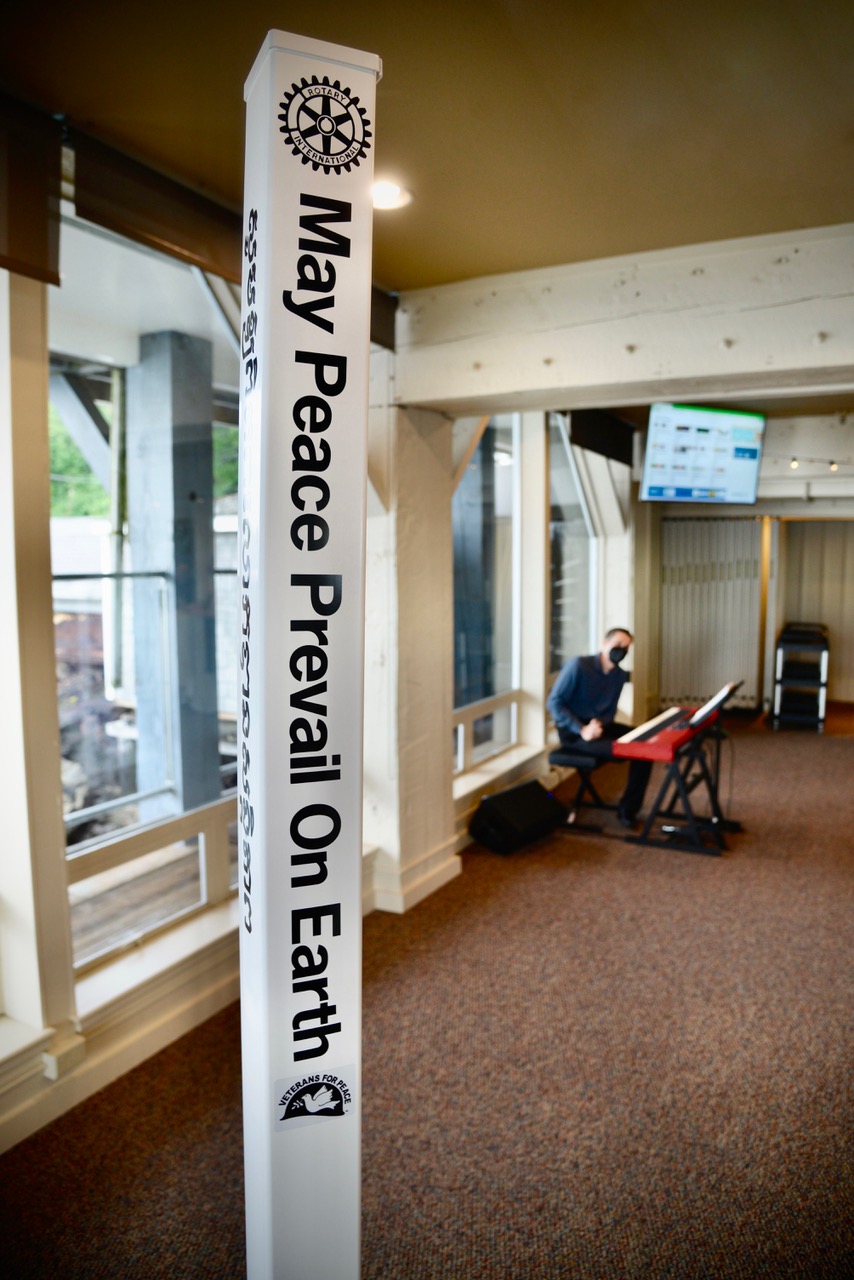Southwest Seattle Historical Society celebrates 25 years with a party and auction
Southwest Seattle Historical Society President Kathy Blackwell spoke to the gathered guests and supporters at the Bridging the Gap event held at Salty's on Alki on June 3.
Photo by Patrick Robinson
Sat, 06/04/2022
The Southwest Seattle Historical Society celebrated 25 years of its own history in the freshly remodeled event space at Salty's on Alki June 3. The event was attended by West Seattle luminaries such as Luna Park Cafe owner and community activist John Bennett, Salty's owners Gerry and Kathryn Kingen, former Executive Director of the museum Clay Eals and wife Meg, The event was also a fundraising auction to help fund a new roof for the museum as well as a new handrail. The museum recently received a $26,000 grant for the purpose and hoped to match that amount through donations and auction proceeds.

The Rotary Club of West Seattle made a donation of a "Peace Pole" to the Society one of three Peace Poles to be donated this year.
- West Seattle Eagles Club, 4426 California Ave.,
- Fauntleroy Church, UCC, 9140 California Ave SW,
- The Log House Museum, 3003 61st Ave SW.
One of Rotary’s primary areas of focus is the promotion of peace throughout the community and world. Peace Poles symbolize the oneness of humanity and our prominent wish for world peace. There are over 250,000 Peace Poles globally, including several in West Seattle. The pole's message is presented in Farsi, English, Cambodian and the language of the native Duwamish tribe.
The power of the Message: “May Peace Prevail On Earth”, lies in its capacity to bring people of various cultures, faith, traditions and political ideals together as one united global heart and mind.

The SWSHS had to struggle at first to secure a home. Here's some background on their history from their website www.loghousemuseum.org:
"The Southwest Seattle Historical Society was founded in 1984 by West Seattle resident and White Center real estate broker Elliott Couden. Founding members chose to dedicate this organization to historic preservation, heritage education, and community service for the Duwamish peninsula, including West Seattle and White Center.
In 1983, South Seattle Community College was forming a lay advisory board for the humanities under a grant from the National Endowment for the Humanities. Joan Mraz, a humanities and art instructor at the college who chaired the advisory board, was seeking a person representing the history of the area to sit on the board. Dottie Harper, a local community activist from Burien, recommended Couden, who was trying to form a local historical society. Couden was invited to sit on the board, and there he shared his vision.
The founding members of the historical society came from West Seattle and White Center, and their scope comprised those areas after they met with Jerry Brockey, college president, and Normie Beers, longtime former West Seattle Chamber of Commerce secretary and YMCA director who had compiled materials for a history book of the area. The vision was to create a history center that covered the entire Duwamish peninsula.
Brockey offered the services of the college to help form a historical society. With the help of John Ashford, college library administrator, the 501(c)3 non-profit Southwest Seattle Historical Society was formed.
Brockey offered the college campus for meetings and storage of the collection. Beers’ book idea was absorbed in the West Side Story book project and published by the West Seattle Herald/White Center News in July 1987. Clay Eals, editor of the papers, served as the book’s editor and project manager, and Brad Chrisman, editorial coordinator, did the fundamental research and wrote most of its chapters.
The founding date for the Southwest Seattle Historical Society was Nov 13, the date of the landing on Alki Beach of the settlers who eventually formed the city of Seattle.
In 1993, the Southwest Seattle Historical Society became aware of the pending sale of a log building at the southwest corner of 61st Avenue Southwest and Southwest Stevens Street that was built as the carriage house for Fir Lodge/Alki Homestead in 1904. Also in 1993, Metro was building a sewage pipeline beneath West Seattle and had created a $500,000 mitigation fund for the Alki/Beach Drive neighborhood. The historical society placed a $200,000 measure on the community ballot, and in March 1994 local residents voted in favor of spending that amount for the purchase of the building for use as a museum.
In a covenant with the City of Seattle, the historical society acquired, restored, and converted the building and named it the Birthplace of Seattle Log House Museum. The restoration was made possible through a grassroots effort led by Arlene Wade, board president, that raised more than $875,000.
The museum has been open since November 13, 1997, the 146th anniversary of the Alki landing in 1851. The landscaping consists of native plants. A granite and marble donor circle adorns the courtyard in tribute to the many people and organizations helping to make this heritage project an award-winning facility and a community treasure."
The Southwest Seattle Historical Society acknowledges that the Log House Museum is on the traditional land of the dxʷdəwʔabš (Duwamish) people, past and present. The museum is built from logs which grew on the land before the arrival of non-Native peoples. We honor with gratitude the land and the people who have stewarded it throughout the generations.
Support local history by visiting the Duwamish Longhouse and Cultural Center.


